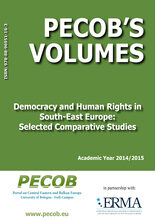and Balkan Europe
by IECOB & AIS Università di Bologna

Democracy and Human Rights in South-East Europe: Selected Comparative Studies
in collaboration with European Regional Master’s Degree in Democracy and Human Rights in South East Europe (ERMA)
by: Jovana Škrijel, Qemal Krosi, Marjan Icovski, Rastko Antić
Edited by: Adriano Remiddi
pp: 125
ISBN: 978-88-96951-16-3

Abstract
When it comes to the process of democratic development and enhancing human rights protection in South-Eastern Europe, 2015 was marked both by encouraging progresses and profound challenges.
The post-socialist and post-conflict transition and transformation process in the Balkan region witnessed a series of successes, but was also confronted with dangerous threats. The protection of minorities, the rise of citizens’ distrust toward the political performance of local élites, the limitations of media and research freedom, and the effectiveness of EU democracy promotion policies have vividly characterized the political and social discourse of the year. In this regard, the effect and hopes set out in the EU integration project and the accession negotiations have been under the spotlight. In 2015, the EU enlargement advanced, slowly, but consistently. After Croatian membership in 2013, Montenegro has started accession negotiations, closing already eight of the foreseen thirty-five chapters, while Serbia is ready to open the first in early 2016 and Albania, as the newest candidate country, has positively progressed in the five key political criteria. At the same time, Bosnia-Herzegovina and Kosovo have seen the Association and Stabilization Agreement enter into force whereas Macedonia seems to have consistently approached the urgent systemic reforms recommended by the EU after the recent political crisis.
These are good news for the region but, nevertheless, a lot remains to be done, especially in terms of the recognition and implementation of social and economic rights - particularly for the most vulnerable social strata - which are increasingly relevant in the context of general dissatisfaction towards politics and social disillusion (especially within the young generations). The interplay of these factors has nowadays become particularly relevant because of the overall inadequate welfare conditions in the region and the pressing immigration crisis, which might lead to an alarming rejection of “otherness”, which has been escalating both across EU member state and the southeastern neighbors.
In light of that, this Volume aims to address some of these crosscutting and burning issues.
The first paper by Škrijel focuses on the integration of the Roma, namely, the biggest ethnic minority in Europe. Through the cases of Romania and Macedonia, the author investigates whether protection, anti-discrimination policies, participation and inclusion of the Roma community functions better within EU member states and if the EU accession process has had a positive impact with regards to the protection of the rights of Roma people.
Subsequently, Krosi analyzes the state building process in Bosnia and Herzegovina and Kosovo, questioning how effective the EU conditionality is in promoting democratic state building in a region of weak states.
In the second section, Icovski focuses on the governmental performance in Bosnia and Herzegovina and Serbia, as countries in transition towards democracy with similar political and historical backgrounds, however, marked by significant disparities in the political management performance. Finally, through the dichotomic cases of Slovenia and Kosovo, Antić analyzes the role of state archives making as the lowest common denominator for both the freedom of information (media, research) and the identity building, in the process of democratic development.
The Volume, which is the result of the joint cooperation between the Institute for Central-Eastern and Balkan Europe (IECOB) and the European Regional Master in Democracy and Human Rights in South-East Europe, will be of interest to students and researchers in the aforementioned fields of democracy development and human rights advancement in the post-Yugoslav space and the Balkan region, and aims at representing a solid contribution of ideas and critical analyses, based on its multidisciplinary and original comparative approach.
In this Volume
Part I - Transition, Society and EU Enlargement
- Common Obstacles towards Democracy: the Protection of Roma Rights in Romania and Macedonia by Jovana Škrijel
- The European Union and State-Building in Bosnia & Herzegovina and Kosovo by Qemal Krosi
Part II - Democracy, Transformation and Governance
- Political Management Performance in Bosnia & Herzegovina and Serbia by Majan Icoski
- Democracy and the Role of Archives in the Creation of the States of Slovenia and Kosovo by Rastko Antić
Download the Volume
PECOB: Portal on Central Eastern and Balkan Europe - University of Bologna - 1, S. Giovanni Bosco - Faenza - Italy
Chiudi la versione stampabile della pagina e ritorna al sito.
 Download the Volume
Download the Volume